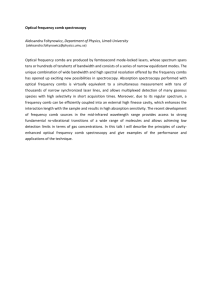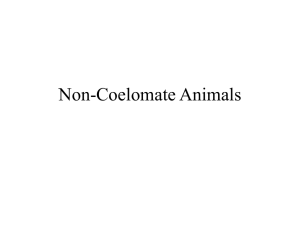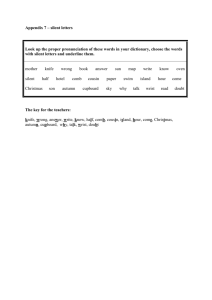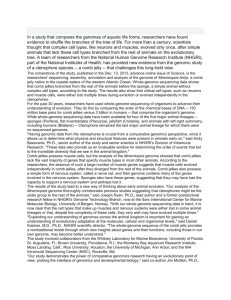Combinations.i6t
advertisement
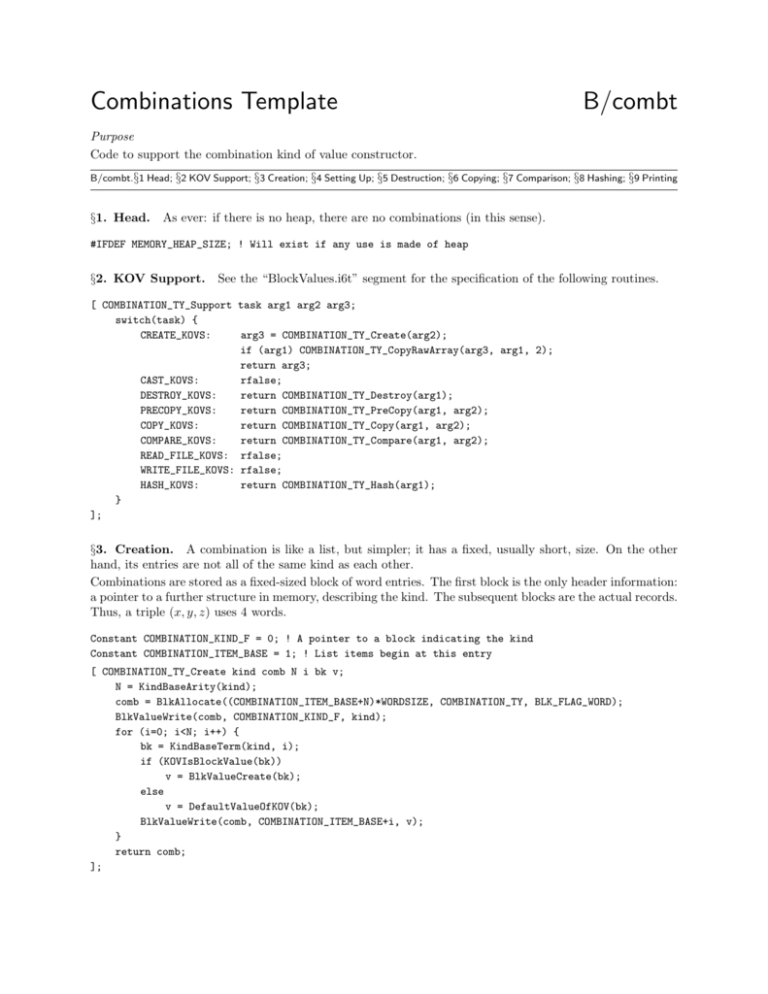
Combinations Template
B/combt
Purpose
Code to support the combination kind of value constructor.
B/combt.§1 Head; §2 KOV Support; §3 Creation; §4 Setting Up; §5 Destruction; §6 Copying; §7 Comparison; §8 Hashing; §9 Printing
§1. Head.
As ever: if there is no heap, there are no combinations (in this sense).
#IFDEF MEMORY_HEAP_SIZE; ! Will exist if any use is made of heap
§2. KOV Support.
See the “BlockValues.i6t” segment for the specification of the following routines.
[ COMBINATION_TY_Support task arg1 arg2 arg3;
switch(task) {
CREATE_KOVS:
arg3 = COMBINATION_TY_Create(arg2);
if (arg1) COMBINATION_TY_CopyRawArray(arg3, arg1, 2);
return arg3;
CAST_KOVS:
rfalse;
DESTROY_KOVS:
return COMBINATION_TY_Destroy(arg1);
PRECOPY_KOVS:
return COMBINATION_TY_PreCopy(arg1, arg2);
COPY_KOVS:
return COMBINATION_TY_Copy(arg1, arg2);
COMPARE_KOVS:
return COMBINATION_TY_Compare(arg1, arg2);
READ_FILE_KOVS: rfalse;
WRITE_FILE_KOVS: rfalse;
HASH_KOVS:
return COMBINATION_TY_Hash(arg1);
}
];
§3. Creation. A combination is like a list, but simpler; it has a fixed, usually short, size. On the other
hand, its entries are not all of the same kind as each other.
Combinations are stored as a fixed-sized block of word entries. The first block is the only header information:
a pointer to a further structure in memory, describing the kind. The subsequent blocks are the actual records.
Thus, a triple (x, y, z) uses 4 words.
Constant COMBINATION_KIND_F = 0; ! A pointer to a block indicating the kind
Constant COMBINATION_ITEM_BASE = 1; ! List items begin at this entry
[ COMBINATION_TY_Create kind comb N i bk v;
N = KindBaseArity(kind);
comb = BlkAllocate((COMBINATION_ITEM_BASE+N)*WORDSIZE, COMBINATION_TY, BLK_FLAG_WORD);
BlkValueWrite(comb, COMBINATION_KIND_F, kind);
for (i=0; i<N; i++) {
bk = KindBaseTerm(kind, i);
if (KOVIsBlockValue(bk))
v = BlkValueCreate(bk);
else
v = DefaultValueOfKOV(bk);
BlkValueWrite(comb, COMBINATION_ITEM_BASE+i, v);
}
return comb;
];
B/combt - Combinations Template
§4
2
§4. Setting Up. NI needs to compile code which will create constant combinations at run-time: the
following routine is convenient for that. A “raw array” in this routine’s sense is an array raw such that raw-->2
contains the number of items, raw-->1 the kind of value, and raw-->3 onwards are the items themselves; note
that this is the same format used for constant lists.
[ COMBINATION_TY_CopyRawArray comb raw rea len i ex bk v w;
if ((comb==0) || (BlkType(comb) ~= COMBINATION_TY)) return false;
ex = BlkValueExtent(comb);
len = raw-->2;
if ((len+COMBINATION_ITEM_BASE > ex) &&
(BlkValueSetExtent(comb, len+COMBINATION_ITEM_BASE) == false)) return 0;
BlkValueWrite(comb, LIST_LENGTH_F, len);
if (rea == 2) bk = BlkValueRead(comb, COMBINATION_KIND_F);
else {
bk = raw-->1;
BlkValueWrite(comb, COMBINATION_KIND_F, bk);
}
for (i=0:i<len:i++) {
v = raw-->(i+3);
if (KOVIsBlockValue(bk)) v = BlkValueCreate(bk, v);
BlkValueWrite(comb, i+COMBINATION_ITEM_BASE, v);
}
#ifdef SHOW_ALLOCATIONS;
print "Copied raw array to comb: "; COMBINATION_TY_Say(comb, 1); print "^";
#endif;
return comb;
];
§5. Destruction.
itself can be freed.
If the comb items are themselves block-values, they must all be freed before the comb
[ COMBINATION_TY_Destroy comb kind no_items i bk;
kind = BlkValueRead(comb, COMBINATION_KIND_F);
no_items = KindBaseArity(kind);
for (i=0; i<no_items; i++) {
bk = KindBaseTerm(kind, i);
if (KOVIsBlockValue(bk))
BlkFree(BlkValueRead(comb, i+COMBINATION_ITEM_BASE));
}
return comb;
];
B/combt - Combinations Template
§6
3
§6. Copying. Again, if the comb contains block-values then they must be duplicated rather than bitwise
copied as pointers.
Global precopied_comb_kov;
[ COMBINATION_TY_PreCopy lto lfrom comb no_items i nv bk;
precopied_comb_kov = BlkValueRead(lto, COMBINATION_KIND_F);
];
[ COMBINATION_TY_Copy lto lfrom no_items i nv kind bk;
kind = BlkValueRead(lto, COMBINATION_KIND_F);
no_items = KindBaseArity(kind);
BlkValueWrite(lto, COMBINATION_KIND_F, precopied_comb_kov);
for (i=0; i<no_items; i++) {
bk = KindBaseTerm(kind, i);
if (KOVIsBlockValue(bk)) {
nv = BlkValueCreate(bk);
BlkValueCopy(nv, BlkValueRead(lfrom, i+COMBINATION_ITEM_BASE));
BlkValueWrite(lto, i+COMBINATION_ITEM_BASE, nv);
}
}
];
§7. Comparison.
This is a lexicographic comparison and assumes both combinations have the same kind.
[ COMBINATION_TY_Compare listleft listright delta no_items i cf kind bk;
kind = BlkValueRead(listleft, COMBINATION_KIND_F);
no_items = KindBaseArity(kind);
for (i=0; i<no_items; i++) {
bk = KindBaseTerm(kind, i);
cf = KOVComparisonFunction(bk);
if (cf == 0 or UnsignedCompare) {
delta = BlkValueRead(listleft, i+COMBINATION_ITEM_BASE) BlkValueRead(listright, i+COMBINATION_ITEM_BASE);
if (delta) return delta;
} else {
delta = cf(BlkValueRead(listleft, i+COMBINATION_ITEM_BASE),
BlkValueRead(listright, i+COMBINATION_ITEM_BASE));
if (delta) return delta;
}
}
return 0;
];
[ COMBINATION_TY_Distinguish txb1 txb2;
if (COMBINATION_TY_Compare(txb1, txb2) == 0) rfalse;
rtrue;
];
B/combt - Combinations Template
§8. Hashing.
[ COMBINATION_TY_Hash comb kind rv no_items i bk;
rv = 0;
kind = BlkValueRead(comb, COMBINATION_KIND_F);
no_items = KindBaseArity(kind);
for (i=0: i<no_items: i++) {
bk = KindBaseTerm(kind, i);
rv = rv * 33 + KOVHashValue(bk, BlkValueRead(comb, i+COMBINATION_ITEM_BASE));
}
return rv;
];
§9. Printing.
[ COMBINATION_TY_Say comb format no_items v i kind bk;
if ((comb==0) || (BlkType(comb) ~= COMBINATION_TY)) return;
kind = BlkValueRead(comb, COMBINATION_KIND_F);
no_items = KindBaseArity(kind);
print "(";
for (i=0; i<no_items; i++) {
if (i>0) print ", ";
bk = KindBaseTerm(kind, i);
v = BlkValueRead(comb, i+COMBINATION_ITEM_BASE);
if (bk == LIST_OF_TY) LIST_OF_TY_Say(v, 1);
else PrintKindValuePair(bk, v);
}
print ")";
];
#IFNOT; ! IFDEF MEMORY_HEAP_SIZE
[ COMBINATION_TY_Support t a b c; rfalse; ];
[ COMBINATION_TY_Say comb; ];
#ENDIF; ! IFDEF MEMORY_HEAP_SIZE
§8
4

